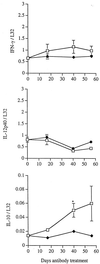Effects of tumor necrosis factor alpha on host immune response in chronic persistent tuberculosis: possible role for limiting pathology
- PMID: 11179363
- PMCID: PMC98092
- DOI: 10.1128/IAI.69.3.1847-1855.2001
Effects of tumor necrosis factor alpha on host immune response in chronic persistent tuberculosis: possible role for limiting pathology
Abstract
Reactivation of latent tuberculosis contributes significantly to the incidence of disease caused by Mycobacterium tuberculosis. The mechanisms involved in the containment of latent tuberculosis are poorly understood. Using the low-dose model of persistent murine tuberculosis in conjunction with MP6-XT22, a monoclonal antibody that functionally neutralizes tumor necrosis factor alpha (TNF-alpha), we examined the effects of TNF-alpha on the immunological response of the host in both persistent and reactivated tuberculous infections. The results confirm an essential role for TNF-alpha in the containment of persistent tuberculosis. TNF-alpha neutralization resulted in fatal reactivation of persistent tuberculosis characterized by a moderately increased tissue bacillary burden and severe pulmonic histopathological deterioration that was associated with changes indicative of squamous metaplasia and fluid accumulation in the alveolar space. Analysis of pulmonic gene and protein expression of mice in the low-dose model revealed that nitric oxide synthase was attenuated during MP6-XT22-induced reactivation, but was not totally suppressed. Interleukin-12p40 and gamma interferon gene expression in TNF-alpha-neutralized mice was similar to that in control mice. In contrast, interleukin-10 expression was augmented in the TNF-alpha-neutralized mice. In summary, results of this study suggest that TNF-alpha plays an essential role in preventing reactivation of persistent tuberculosis, modulates the pulmonic expression of specific immunologic factors, and limits the pathological response of the host.
Figures






References
-
- Adams L B, Mason C M, Kolls J K, Scollard D, Krahenbuhl J L, Nelson S. Exacerbation of acute and chronic murine tuberculosis by adminstration of a tumor necrosis factor receptor-expressing adenovirus. J Infect Dis. 1995;171:400–405. - PubMed
-
- Ando M, Dannenberg A M, Shima K. Macrophage accumulation, division, maturation and digestive and microbiocidal capacities in tuberculous lesions. II. Rate at which mononuclear cells enter and divide in primary BCG lesions and those of reinfection. J Immunol. 1972;109:8–19. - PubMed
-
- Anonymous. The use of preventive therapy for tubercuous infection in the United States: recommendations of the Advisory Committee for Elimination of Tuberculosis. Morb Mortal Wkly Rep. 1990;39:9. - PubMed
-
- Balcewicz-Sablinska M K, Keane J, Kornfeld H, Remold H G. Pathogenic Mycobacterium tuberculosis evades apoptosis of host macrophages by release of TNF-R2, resulting in inactivation of TNF-α. J Immunol. 1998;161:2636–2641. - PubMed
-
- Bean A G D, Roach D R, Briscoe H, France M P, Korner H, Sedgwick J D, Britton W J. Structural deficiencies in granuloma formation in TNF gene-targeted mice underlie the heightened susceptibility to aerosol Mycobacterium tuberculosis infection, which is not compensated for by lymphotoxin. J Immunol. 1999;162:3504–3511. - PubMed
Publication types
MeSH terms
Substances
Grants and funding
LinkOut - more resources
Full Text Sources
Other Literature Sources

